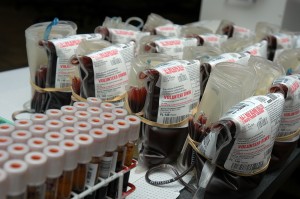What is Postpartum Haemorrhage?
Postpartum bleeding or postpartum hemorrhage (PPH) is often defined as the loss of more than 500 ml or 1,000 ml of blood within the first 24 hours following childbirth.
More infoWhat is tranexamic acid?
Tranexamic acid (or TXA) is a blood clot stabiliser that was discovered in Japan in the 1950’s. There have been a number of small trials of tranexamic acid in obstetric bleeding, most of which show a decrease in blood loss, but they do not accurately assess its effect on maternal outcomes.
More infolatest news
About the WOMAN trials
The WOMAN Trials have a simple aim. To ensure a safe childbirth for all women everywhere. These global trials are producing the evidence needed to stop women dying in childbirth. Heavy bleeding after childbirth, called a postpartum haemorrhage or PPH, is the main cause of maternal death, killing tens of thousands of mothers every year. The WOMAN trials are looking at the effect of the drug tranexamic acid (TXA) on bleeding and the best ways to give it.
In 2017, the WOMAN Trial found that TXA reduces death from bleeding and the need for surgery to control bleeding by about one third when given to women with postpartum haemorrhage within three hours of birth. There were no adverse effects for mothers or babies. The trial recruited over 20,000 women worldwide.
The WOMAN-2 Trial is currently investigating whether TXA can prevent women developing PPH in the first place. This trial will recruit 15,000 women giving birth vaginally with anaemia. The trial results will be published in 2023.
The I’M WOMAN Trial, part of the TRANSFORM project, is looking at easier and more accessible ways to give TXA – intramuscularly, rather than intravenously – with the aim of expanding access to timely TXA treatment.
If TXA could be given intramuscularly, women giving birth outside of hospitals would have access to this lifesaving drug and healthcare workers would be able treat women faster. This is crucial when a woman can bleed to death in a matter of minutes. The trial will start recruiting 30,000 women in 2023.
Find out more about our growing body of work to improve maternal health worldwide:
- WOMAN-2 Trial website
- I’M WOMAN Trial website
- WOMAN Trial website
- LSHTM’s Clinical Trials Unit website
- Tranexamic Acid (TXA) Central website
- Her Life Matters documentary film
Follow us on Twitter @WOMANTrial and through the hashtag #TheWOMANTrials
The trial in numbers

17,977 patients recruited

20 recruiting countries.

199 hospitals and medical centres.
Scientific Rationale

Postpartum haemorrhage is a leading cause of postpartum mortality globally.
Treatments for postpartum haemorrhage (pph) such as blood transfusion can be very dangerous, and other current treatments do not have sufficient evidence to prove efficacy. Antifibrinolytics have been shown to reduce blood loss after surgery, the CRASH-2 trial of 20,211 trauma patients showed TXA safely reduces the risk of death from bleeding by a relative 15%. However, previous trials studying PPH are too small to confirm or refute moderate effects, therefore a large trial testing a simple, relatively cheap intervention like TXA could prevent deaths and morbidity associated with PPH.
Laypersons Rationale
Bleeding after childbirth is the leading cause of maternal death globally.
Although tranexamic acid is commonly used to reduce surgical bleeding, to date there have been no proper clinical trials to assess its value in treating excessive bleeding after childbirth. We hope that it will reduce death due to bleeding but pregnant women are also at risk of death from unwanted blood clotting and so we need to find out if the benefits exceed the harms. The best way to do this is in a clinical trial where women with post partum haemorrhage are randomly allocated to get either tranexamic acid or placebo in addition to their usual care. By comparing deaths and side effects in the two groups we can discover whether tranexamic acid is useful.





